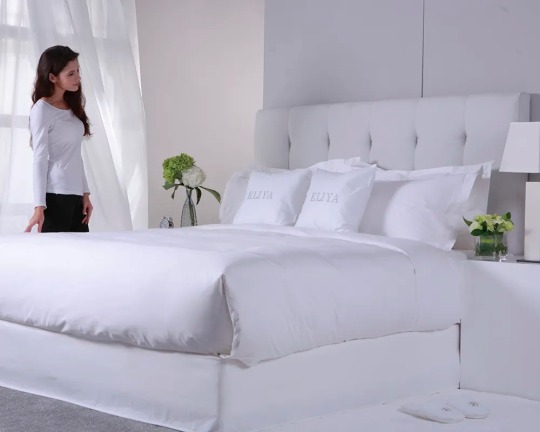Don't wanna be here? Send us removal request.
Text
Linen Suppliers: Essential Partners in Comfort, Cleanliness, and Style
In industries where comfort, hygiene, and presentation are paramount—such as hospitality, healthcare, and food service—quality linens are more than just accessories. They are fundamental to the customer experience. Behind every neatly made hotel bed, crisp restaurant table setting, or sterile medical gown is a linen supplier—a vital partner that ensures businesses always have access to high-quality, reliable textile products.

What Is a Linen Supplier?
A linen supplier provides a range of textile products used in commercial and institutional settings. These suppliers either manufacture, distribute, or source linens in bulk for industries that require frequent laundering, high durability, and consistent presentation.
Typical product categories include:
Bed Linens: Sheets, pillowcases, duvet covers, and mattress protectors
Bath Linens: Towels, bathrobes, washcloths, and bath mats
Table Linens: Tablecloths, napkins, runners, and chair covers
Kitchen & Service Linens: Aprons, dish towels, chef coats, and server uniforms
Healthcare Linens: Gowns, scrubs, blankets, and patient bedding
Industries Served
Linen suppliers cater to a wide range of sectors, including:
Hospitality (Hotels, Resorts, Spas)
Healthcare (Hospitals, Clinics, Senior Care Facilities)
Food & Beverage (Restaurants, Cafes, Catering Services)
Event Management (Weddings, Conferences, Banquets)
Industrial and Corporate (Uniforms, Cleaning Services, Laboratories)
Key Qualities of a Reliable Linen Supplier
Choosing the right linen supplier can significantly impact operations, brand image, and cost-efficiency. Here are the most important factors to consider:
1. Quality and Durability
High-grade fabrics such as 100% cotton, cotton-poly blends, or antimicrobial materials are essential for long-term use, especially in environments with frequent washing cycles.
2. Consistent Supply
Top suppliers maintain robust inventory systems and logistics networks to ensure timely and consistent deliveries, even in high-demand seasons.
3. Customization and Branding
Many suppliers offer custom embroidery, logo printing, color matching, and sizing to help businesses align their linens with brand identity.
4. Sustainability
Eco-conscious businesses now prefer linen supplier that offer organic textiles, recycled materials, and sustainable production practices.
5. Responsive Service
A reliable supplier provides responsive customer support, flexible ordering options, and proactive communication to ensure customer satisfaction.
Linen Supply Models
There are two main types of linen supply models:
Purchase Model: The business buys linens outright, managing their laundering and inventory internally.
Rental or Linen Service Model: The supplier owns the linens and provides a rental program that includes regular laundering, delivery, and replacement. This model is common in healthcare and hospitality sectors.
Trends in the Linen Supply Industry
Smart Textiles: Some suppliers are experimenting with RFID-tagged linens for better inventory tracking.
Sustainable Fabrics: There’s growing demand for organic cotton, bamboo fiber, and recycled textiles.
Color and Design Variety: More clients are requesting linens that reflect brand colors or offer modern styling.
Conclusion
A professional linen supplier is far more than a vendor—they’re a strategic partner that supports business operations, enhances customer perception, and maintains essential hygiene and presentation standards. Whether you're running a five-star hotel, a busy restaurant, or a healthcare facility, choosing the right linen supplier ensures your business is wrapped in quality, efficiency, and professionalism from the ground up.
1 note
·
View note